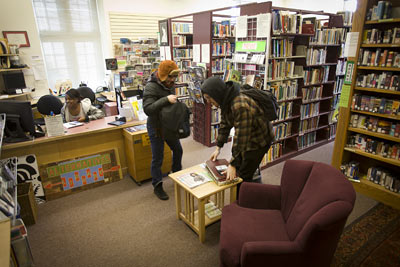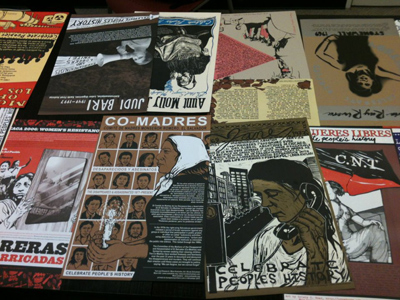Durland Alternatives Library promotes social justice
By Farhan Nuruzzaman


Nestled in Anabel Taylor Hall, the Durland Alternatives Library offers "issue-oriented" resources -- from anarchism, environmental activism and feminism to queer, indigenous and class combat studies -- that promote social justice and are difficult to find in other libraries.
Founded in 1974 in honor of local activist Anne Carry Durland, the library is a partner of the Center for Transformative Action, a Cornell-affiliated nonprofit dedicated to social entrepreneurship and action. The library houses some 13,000 books, zines, documentaries, feature films, music, audio books and periodicals. It networks with campus and community agencies involved in many forms of local, regional and global activism.
"With our vast collection, we create a space that nurtures dialogue and promotes a radical, 'connect the dots' approach to social change," says its website.
"Libraries are a space for many worlds to co-exist," added library director Ryan Clover-Owens. The location of the library is fitting, he said, because Anabel Taylor Hall "seeks to bring together different faiths and organizations and essentially [tell] stories about who we are and what our meaning is."
Unlike the Cornell University Library, Durland Alternatives Library is open to the public and issues its own card to borrowers. It is affiliated with the Finger Lakes Library System, but despite the library's small size, it is the second-largest supplier of books in the system's interlibrary loan network.
Patrons often turn to the Durland Alternatives Library's eclectic collection, said assistant director Gary Fine, when they can't find what they're looking for.
"Here you have a space for people from a variety of different fields who are trying to figure out how to fix contemporary problems," said Clover-Owens, who adds that the library's various programs promote outreach, education and social awareness.
One of the library's newest programs, the Celebrate People's History program, commemorates social movements, minority struggles and revolutions through a series of posters designed by some 80 artists. The library sells the posters to spread awareness of these issues and to raise funds.
Part of the Durland Alternatives Library's mission is also to reach out to underserved populations, particularly prison inmates. Thus, Fine created the Prisoner Express program, which donates materials to prisoners across the country.
A streaming and podcast show called Lit Match Radio, which will be broadcast from the library's website, is being planned. It will offer "a series of 5- and 10-minute pieces in which we read from alternative literature and discuss its significance," Clover-Owens said.
The library hosts a variety of free events, such as a reading of "Prison Blossoms: Anarchist Voices from the American Past" April 15 at 4:30 p.m. The book contains essays penned by anarchists imprisoned for trying to assassinate steel magnate Henry Clay Frick in 1892.
Prisoner Express Program
The Prisoner Express Program seeks to foster rehabilitation of prisoners through literacy and self-expression. Gary Fine, assistant director of the Durland Alternatives Library in Anabel Taylor Hall, started the program after receiving a letter from a prisoner who asked to borrow books.
The program donates books to thousands of prisoners across the country. Prisoners request the kinds of books they'd like, and the program tries to match those requests. It also generates a newsletter in which prisoners can share their writing and art and engage with a wider community. Volunteers and Cornell work-study students type prisoners' letters for the newsletter and mail books to prisoners. The program has also compiled anthologies of poems by prisoners and assembled a journal of reflections from inmates regarding life in prison, which are posted on the Prisoner Express website.
Farhan Nuruzzaman '12 is a writer intern for the Cornell Chronicle.
Get Cornell news delivered right to your inbox.
Subscribe